 |
 |
 |
 |
|
|
|
|
|
|
|
|
|
|
|
The powerful Asian- African block within the International Cricket Council (ICC) flexed its muscles to reject former Australian prime minister John Howard’s nomination for the vice- president’s post on Wednesday — the day Sharad Pawar became only the second Indian to become ICC president. Howard’s hard- line policy as prime minister (1996- 2007) against President Robert Mugabe’s regime in Zimbabwe and his lack of experience in cricket administration seem to have gone against him. As expected — India, Pakistan, Sri Lanka, Bangladesh, South Africa and West Indies — opposed his candidature while England, New Zealand and Australia were in Howard’s favour. “ The ICC executive board today met to discuss the nomination of John Howard for the role of ICC vice- president for the period 2010- 12. Following lengthy consideration, it was recognised that the nomination put forward by Cricket Australia and New Zealand Cricket (NZC) did not have sufficient support within the ICC board. No vote was taken,” ICC said in a statement from Singapore. Howard, as prime minister, had openly called Sri Lankan offspinner Muttiah Muralitharan a chucker in the 1990s. The rightwing politician had also antagonised many when he backed Australian umpire Darrell Hair, who had awarded a Test match to England against Pakistan in 2007 amid ball- tampering allegations against the Asians. Howard said his political decisions went against him. “ I’m disappointed at the outcome. I wanted to do this job; I felt I could do it well,” he told Sky News. “ Even in private discussions, they are very reluctant to give a particular reason. If it was in some way based on past political positions, well, that’s a very bad precedent to be establishing.” As per ICC rules, Australian and New Zealand boards will now submit a new nominee by August 31. Former NZC chairman John Anderson, who lost out to Howard, could finally win the nomination. Only one other Indian — Jagmohan Dalmiya (1997- 2000) – and another Asian — Pakistani Ehsan Mani (2003- 2006) — have held the ICC top post before Pawar. Pawar, who just completed a two- year term as ICC vice- president, is a former BCCI president and currently head of the Mumbai Cricket Association (MCA). He took over from Englishman David Morgan. Mani wished Pawar, 69, well. “ Mr. Pawar’s political background is, I believe, good for the ICC. I am delighted that he has been chosen by BCCI and wish him well,” Mani told M AIL T ODAY from England. “ The resumption of bilateral series between Pakistan and India must be on top of Mr. Pawar’s list. I was faced with the same challenge when I became ICC president and worked hard to assist in the resumption of cricketing ties between India and Pakistan,” he said. Since Pawar is already preoccupied with Indian politics, he would rely heavily on the expertise of IS Bindra, ICC’s principal advisor and seasoned cricket administrator, to run the world body on a daily basis. And, Pawar will, of course, have the full backing of the BCCI. The highlight of Pawar’s two- year tenure will be next year’s World Cup, to be hosted by India, Sri Lanka and Bangladesh.
ICC Chief Executives' Committee The ICC Chief Executives' Committee (CEC) is the key forum for making recommendations on the business of cricket. The CEC includes the Chief Executives of the 10 Test-playing nations and three representatives from the Associate Member level and refers policy issues to the Executive Board for approval. The CEC - formerly the
Cricket Committee Management (CCM) - was renamed on 1 April 2004.
Malcolm Speed (Chairman)
ICC Chief Executive Officer
Full Members
Associate Members
ICC Awards: Dravid is Player of the
Year
London: Stylish batsman Rahul Dravid was the toast of the inauguaral ICC Awards with three glittering picks, including the most coveted Player of the Year Award, at the Alexandra Palace here. The Indian vice-captain also named the best Test player as well as a selection in the Test team, but the function failed to live up to its billing as the 'Cricket Oscars'. It was too straight-jacket; compering insipid and the evening was not wholesome in a way one associates with Hollywood or even Bollywood functions. The saving grace was the authenticity and respect which went with the awards chosen by the sport's highest governing authority. Irfan Pathan was another Indian to walk off with a huge honour of being accorded the Emerging Player of the Year Award. This along with the selection of Sachin Tendulkar and Virender Sehwag in the One-Day team made it a special night for Indian cricket. England all-rounder Andrew Flintoff won the One-Day player of the year Award while the New Zealand team bagged the Spirit of Cricket Award. Australian Simon Taufel was named the Umpire of the Year. Dravid was pleased with the honour and said the awards would act as a spur towards greater performance. "The good performances have probably come about because of better fitness. It is also because I am more relaxed about my cricket and am also more comfortable as a person. "But I still believe there is a lot to achieve and a lot more I can do," he said. The ICC Awards, presented by Hyundai in association with the players' body FICA, recognise the game's best players of the past 12 months. Dravid polled 64 votes to win the Sir Garfield Sobers Trophy for the best player. Flintoff (44) nudged out South African all-rounder Jacques Kallis (44) for second place on count back while Australian batsman Matthew Hayden came fourth with 38 votes. The Indian star polled 82 votes to claim the Test player of the year honour, ahead of Hayden (53), England fast bowler Steve Harmison (38) and Sri Lankan off-spinner Muthiah Muralitharan (30). In the voting period from August 1, 2003 to July 31, 2004 Dravid scored 1241 runs in nine Tests at an average of 95.46 with three centuries. Dravid, who also doubles up as the wicketkeeper in One-Day matches jokingly said given the kind of form the Indian team has exhibited in recent weeks, the awards might save from a few effigies being burnt back home. The middle-order batsman rated his double hundred at Adelaide against Australia as his most important innings last season. The voting academy included the 10 ICC full member captains, the Emirate Elite Panel of eight ICC umpires, seven members of the Emirates Elite Panel of ICC referees and a combination of 25 former cricketing legends and members of the media. Pathan claimed 100 votes ahead of Pakistan's Yasir Hameed (75) and Australia's Michael Clarke (45). Another Pakistan youngster Umar Gul rounded out on the top four with 21 votes. In the voting period, Pathan played five Tests and 18 one-day internationals. He took 16 wickets at an average of 38.00 and 36 ODI scalps at an average of 23.19. The 19-year-old said winning the award is further inspiration for him though just turning up for the Indian team was motivation enough for him. "For me my debut for India was the biggest moment of my life. But this is the first award I have achieved and I cherish it," he said. Batting legend Tendulkar made it to the one-day team as did Virender Sehwag, but the former was shockingly omitted from the Test team. Tendulkar, with 47 votes, finished second to Flintoff in the race for the best One-Day International player while the Australian pair of Adam Gilchrist and Ricky Ponting polled 36 votes each. Flintoff captured 12 ODI wickets from 12 matches at 20.50 and scored 551 runs at an average of 78.71. Among other star cricketers, South African Jacques Kallis figured in both the Test and One-Day sides as does Brian Lara (West Indies), Chaminda Vaas (Sri Lanka) and Jason Gillespie (Australia). Lara did not receive any personal award last night despite scoring the world record score of 400 not out but he did not begrudge the individual honours which came Dravid's way. "I've followed Dravid's performance closely in the last one year and feel his honours are richly deserved," Lara said. Kallis felt he has improved a great deal in the past one year as a person but said too much of cricket is proving a strain on cricketers, especially all-rounders. "I have always believed there is too much of cricket being played these days. For all-rounders who are doing duty in both Tests and one-dayers, it is a big strain," Kallis said. Ponting, who was nominated the imaginary captain of both Test and One-Day sides, backed his team to win the upcoming Champions Trophy. "I hope Australia win the trophy by a run or two." The Awards: Player of the Year: Rahul Dravid (Ind) Test Player of the Year: Rahul Dravid (Ind) ODI Player of the Year: Andrew Flintoff (Eng) Emerging Player of Year: Irfan Pathan (Ind) Umpire of the Year: Simon Taufel (Aus) Spirit of Cricket: New Zealand Test Team of the Year: Ricky Ponting (Captain, Aus), Matthew Hayden (Aus), Herschelle Gibbs (SA), Rahul Dravid (Ind), Brian Lara (WI), Jacques Kallis (SA), Adam Gilchrist (Aus), Chaminda Vaas (SL), Shane Warne (Aus), Jason Gillespie (Aus) and Stephen Harmison (Eng). ODI Team of the Year: Ricky Ponting (Captain, Aus), Adam Gilchrist (Aus), Sachin Tendulkar (Ind), Chris Gayle (WI), Brian Lara (WI), Virender Sehwag (Ind), Jacques Kallis (SA), Andrew Flintoff (Eng), Shaun Pollock (SA), Chaminda Vaas (SL) and Jason Gillespie (Aus). |
| About the ICC
The International Cricket Council (ICC) is the governing body for international Test Match and One Day International (ODI) cricket. It retains a full time chief executive and staff based in London, UK and has an Executive Board structure consisting of representatives from all ten Test Match playing countries (Full Members), plus Associate Members. ICC Mission Statement As the international governing body for cricket, the International Cricket Council will lead by promoting the game as a global sport, protecting the spirit of cricket and optimising commercial opportunities for the benefit of the game. This statement highlights the ICC’s four key responsibilities; leadership, promoting the globalisation of cricket, maintaining and enhancing the traditional spirit of the game, and ensuring the commercial prosperity of cricket. |
|
Cricket Committee-Management Cricket Committee-Management is the Committee of Chief Executives of the ten Test playing nations together with three representatives from the Associate Members to deal with the operational and management matters relating to the administration and operation of the game of cricket. Malcolm Speed EX-OFFICIO
FULL MEMBERS Australia
Bangladesh
England
India
New Zealand
Pakistan
Sri Lanka
South Africa
Zimbabwe Vince Hogg
ASSOCIATE MEMBERS
Israel
Namibia
Scotland
|
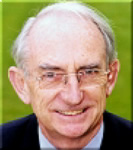
Mr M Gray PRESIDENT - Chairman |

Mr M Speed CHIEF EXECUTIVE OFFICER |
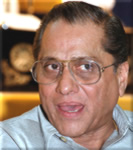
Mr J Dalmiya India |
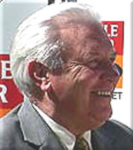
Mr B Merriman Australia |
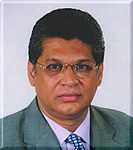
Mr Mohammad Ali Asghar Bangladesh |

Mr D Morgan England |

Sir John Anderson New Zealand |
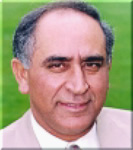
Lt. General Tauqir Zia Pakistan |
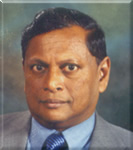
Mr H Amarasuriya Sri Lanka |
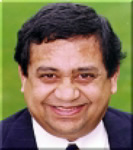
Mr P Sonn South Africa |

Rev W Hall West Indies |
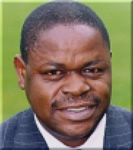
Mr P Chingoka Zimbabwe |
ASSOCIATE MEMBERS

Mr J Rayani Kenya |

HRH Tunku Imran Malaysia |
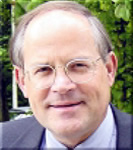
Mr R van Ierschot Holland |
| ICC HISTORY AND BACKGROUND
On June 15th, 1909 representatives from England, Australia and South Africa Foundation Members met at Lords and founded the Imperial Cricket Conference. Membership was confined to the governing bodies of cricket within the British Commonwealth where Test Match cricket was played. In 1926 India, New Zealand and West Indies were elected as Full Members and were joined by Pakistan in 1953, Sri Lanka in 1981, Zimbabwe in 1992 and Bangladesh in 2000. South Africa, one of the three original Foundation Members, ceased to be a member of ICC on leaving the British Commonwealth in 1961, but was re-elected as a Full Member in 1991. In 1965, the Conference was renamed the International Cricket Conference and new rules adopted to permit the election of countries from outside the British Commonwealth. This led to the expansion of the Conference, with the admission of Associate Members. Associates were each entitled to one vote, while the Foundation and Full Members were entitled to two votes on ICC resolutions. Foundation Members retained a right of veto. Today the ICC has 27 Associate Members. An Associate Member is a cricket playing country where the game is firmly established and organised. The sole governing body for cricket in that country must be recognised by ICC. There are also 47 ICC Affiliate Members. Affiliates are categorised as having a governing body for cricket in that country or geographical area that is recognised by ICC and where cricket is played in accordance with the Laws of Cricket. Affiliate Member status excludes attendance, voting, proposing or seconding resolutions at ICC meetings. In 1989 new rules were adopted and the name changed to the International Cricket Council. The motivating factor behind this was the need to move the organisation from being a 'forum for discussion', in which only recommendations to Members could be made, to a body where binding decisions are taken for effective management of the game internationally. Four years later in 1993 the ICC appointed David Richards, a former chief executive of the Australian Cricket Board as its first chief executive and established a new administrative head office at Lord's cricket Ground. In July 2001 Malcolm Speed succeeded David Richards as Chief Executive Officer. Malcolm led the Australian Cricket Board with distinction from 1997, during which time the national team confirmed its position as the leading Test and One Day side in world cricket. He is a barrister by profession, holding a LLB from Melbourne University and practising as a solicitor from 1971 to 1982 and as a barrister between 1983 and 1994. He has been heavily involved in Australian
basketball, being Executive Chairman of the National Basketball League
between 1988 and 1997 and Executive Chairman of Basketball Australia from
1994 to 1997.
|
| Cricket Committee-Playing
The Cricket Committee Playing is a Committee responsible to Cricket Committee-Management to deal with any matters or issues relating to the game or the playing of the game of cricket. Sunil Gavaskar EX-OFFICIO Malcolm Gray , Malcolm Speed FULL MEMBERS
|
|
|
|
|
|
|
|
|
|
|
|
|
|
|
 |
|
 |
|
|
All rights reserved. No part of this publication and other sites of under liveindia.com may be transmitted or reproduced in any form or by any means without prior permission from the publisher Live India Internet Services or Rajesh Chopra, L.C.Premium Cables, 1826, Amar Nath 2nd Building, Bhagirath Palace Delhi - 110006, India. Liveindia.com or Mr.Rajesh Chopra is not responsible for any wrong information under this site, For confirmation of any information it is recommended that you can reconfirm from yours end. |
| Privacy Policy for LiveIndia.Com |